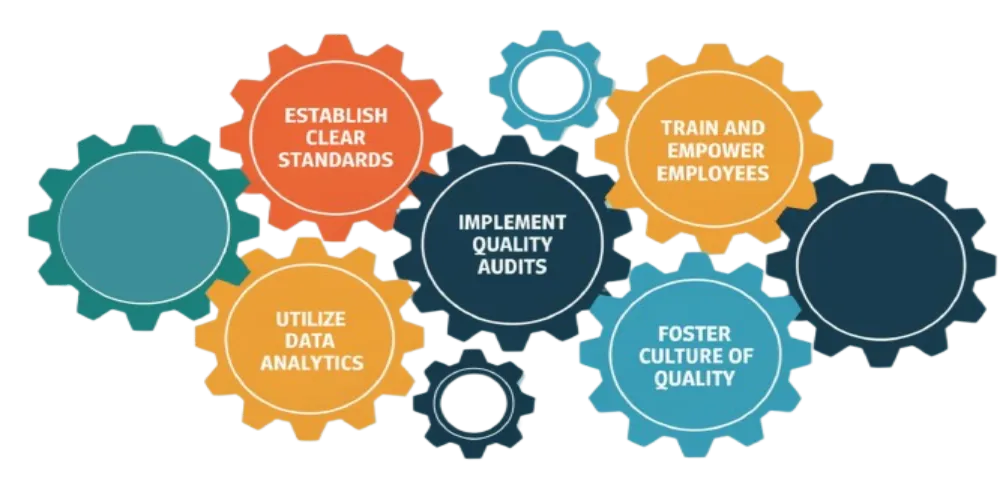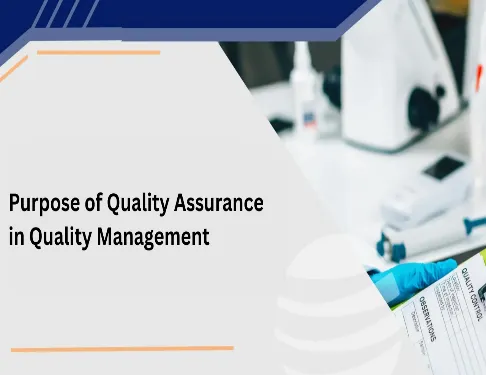Quality Assurance Methods and Their Benefits
When consumer expectations are higher, maintaining quality is not just an option—it's a necessity. Quality assurance (QA) methods are the backbone of successful...
By AMREP | Posted on October 21, 2024

Every interaction shapes customer perceptions. So, quality assurance (QA) has become the backbone of successful organizations. It’s not just about checking boxes; it’s about building trust and delivering consistent value. Effective quality assurance ensures that products and services not only meet but exceed expectations, transforming customer satisfaction into brand loyalty. By integrating QA into quality management, companies can streamline processes, reduce risks, and foster a culture of accountability. This blog will delve into the pivotal role of quality assurance, illustrating how it elevates quality management from a mere compliance exercise to a strategic advantage that drives growth and innovation.
Quality assurance refers to the systematic processes and procedures implemented to ensure that a product or service meets specific quality standards before it reaches the customer. Unlike quality control, which focuses on identifying defects in finished products, QA is proactive. It aims to improve and stabilize production and associated processes to avoid issues in the first place.
Implementing effective QA practices is not just a best practice; it’s a necessity. Here’s why quality assurance matters and how it can significantly impact your organization.
At the heart of any successful business is the customer. Quality assurance ensures that products and services meet or exceed customer expectations. By consistently delivering high-quality offerings, organizations build trust and loyalty, leading to repeat business and positive word-of-mouth referrals.
Implementing effective QA methods can significantly reduce costs associated with defects, rework, and returns. By identifying potential issues early in the production process, organizations can minimize waste and avoid costly errors. This not only enhances profitability but also optimizes resource allocation.
Quality assurance processes streamline operations by establishing clear guidelines and standards. When employees understand what is expected of them, they can work more efficiently, leading to increased productivity. Furthermore, a culture of quality encourages collaboration and communication among teams, facilitating smoother workflows.
Many industries are subject to strict regulations and standards. Quality assurance helps organizations comply with these requirements by ensuring that processes are documented and monitored. This not only mitigates the risk of legal issues but also enhances the organization's credibility and reputation.
Quality assurance is not a one-time effort; it is an ongoing process that fosters a culture of continuous improvement. By regularly reviewing processes and outcomes, organizations can identify areas for enhancement. Techniques such as Six Sigma and Total Quality Management (TQM) encourage a mindset of innovation, helping businesses stay competitive.
Incorporating QA into quality management helps organizations proactively identify and mitigate risks. By analyzing potential failure modes and their impacts, companies can develop strategies to prevent issues before they arise. This proactive approach not only protects the organization’s reputation but also ensures operational stability.
A strong quality assurance program empowers employees by involving them in the quality management process. When employees feel responsible for the quality of their work, it fosters a sense of ownership and accountability. Engaged employees are more likely to take pride in their work and contribute to a culture of quality.
To fully leverage the benefits of quality assurance, organizations must integrate it into their overall quality management strategy. Here are some steps to achieve this:

Define quality standards for products and services based on customer expectations and industry benchmarks. Ensure that all employees are aware of these standards and understand their importance.
Invest in training programs that equip employees with the knowledge and skills needed for effective quality assurance. Empower them to take ownership of their work and contribute to quality improvement initiatives.
Regularly conduct quality audits to assess compliance with established standards. Use these audits as opportunities for feedback and improvement rather than as punitive measures.
Leverage data analytics to monitor quality metrics and identify trends. Analyzing data allows organizations to make informed decisions and implement targeted improvements.
Encourage a culture where quality is prioritized at all levels of the organization. Recognize and reward employees who contribute to quality improvement efforts, reinforcing the importance of QA in daily operations.
Quality assurance not only ensures that products and services meet established standards but also drives customer satisfaction, operational efficiency, and continuous improvement. By integrating quality assurance into their overall strategy, organizations can achieve sustainable success and maintain a competitive edge in the marketplace. Investing in quality assurance is ultimately an investment in the future of the organization, leading to excellence in every aspect of operations.
At AMREP, our expertise helps businesses not only implement effective QA practices but also cultivate a culture of quality that resonates throughout the organization. With AMREP as your partner, you can confidently navigate the complexities of quality management, ensuring that your operations are not only efficient but also aligned with the highest standards of excellence. Together, let’s pave the way for a future defined by quality and success.
Contact Us To See What We Can Do
Call Us
Mon - Sat 9.00 - 18.00
Sunday Closed


14 - October 2024
14
October
2024
When consumer expectations are higher, maintaining quality is not just an option—it's a necessity. Quality assurance (QA) methods are the backbone of successful...

25 - September 2024
25
September
2024
In today's competitive markets quality assurance (QA) management is essential for businesses aiming to meet and exceed the strict standards of product quality...

24 - September 2024
24
September
2024
At the heart of societal growth and business success lies the fundamental element of trust. In the absence of trust, systems, relationships, and commercial endeavors...
